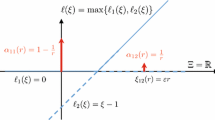Abstract
Stochastic dominance has been typically used with a special emphasis on risk and inequality reduction something captured by the concavity of the utility function in the expected utility model. We claim that the applicability of the stochastic dominance approach goes far beyond risk and inequality measurement provided suitable adaptations be made. We apply in this article the stochastic dominance approach to the measurement of elitism which may be considered the opposite of egalitarianism. While the usual stochastic dominance quasi-orderings attach more value to more equal and more efficient distributions, our criteria ensure that, the more unequal and the more efficient the distribution, the higher it is ranked. Two instances are provided by (i) comparisons of scientific performance across institutions like universities or departments, and (ii) comparisons of affluence as opposed to poverty between countries.
Similar content being viewed by others
References
Atkinson AB, Bourguignon F (1987) Income distributions and differences in needs. In: Feiwel G (eds) Arrow and the foundations of the theory of economic policy. Macmillan, New York, pp 350–370
Atkinson AB, Rainwater L, Smeeding T (1995) Income distribution in OECD countries. OECD Social Policy Studies No. 18, Paris
Bazen S, Moyes P (2003) International comparisons of income distributions. Res Econ Inequal 9: 85–111
Blundell R, Lewbel A (1991) The information content of equivalence scales. J Econom 50: 49–68
Bourguignon F (1989) Family size and social utility: income distribution dominance criteria. J Econom 42: 67–80
Buhmann B, Rainwater L, Schmaus G, Smeeding TM (1988) Equivalence scales, well-being, inequality and poverty: sensitivity estimates across ten countries using the Luxembourg Income Study (LIS) database. Rev Income Wealth 34: 115–142
Carayol N, Lahatte A (2009) Dominance relations and universities ranking. GREThA discussion paper #2009-02. CNRS-Université Montesquieu, Bordeaux IV
Chateauneuf A, Moyes P (2004) Lorenz non-consistent welfare and inequality measurement. J Econ Inequal 2: 61–87
Chateauneuf A, Moyes P (2006) Measuring inequality without the Pigou-Dalton condition. In: McGillivray M (eds) Inequality, poverty and well-being. Palgrave Macmillan, Basingtoke, pp 22–65
Combes P-P, Linnemer L (2003) Where are the economists who publish? Publication concentration and rankings in Europe based on cumulative publications. J Eur Econ Assoc 1: 1250–1308
Coupé T (2003) Revealed performances: worldwide rankings of economists and economics departments, 1990–2000. J Eur Econ Assoc 1: 1309–1345
Dalton H (1920) The measurement of the inequality of incomes. Econ J 30: 348–361
Dusansky R, Vernon CJ (1998) Rankings of U.S. economics departments. J Econ Perspect 12: 157–170
Ebert U (1988) Measurement of inequality: an attempt at unification and generalization. Soc Choice Welf 5: 59–81
Ebert U, Moyes P (2010) Talents, preferences and inequality of well-being. GREThA, Université Montesquieu, Bordeaux IV
Ebert U, Moyes P (2011) Inequality of well-being and isoelastic equivalence scales. GREThA, Université Montesquieu Bordeaux IV
Fishburn PC (1974) Convex stochastic dominance with continuous distribution functions. J Econ Theory 7: 143–158
Fishburn PC, Vickson RG (1978) Theoretical foundations of stochastic dominance. In: Whitmore G, Findlay M (eds) Stochastic dominance. Lexington Books, Lexington, pp 39–113
Foster JE, Shorrocks AF (1988) Poverty orderings and welfare dominance. Soc Choice Welf 5: 91–110
Gastwirth J (1971) A general definition of the Lorenz curve. Econometrica 39: 1037–1039
Gravel N, Moyes P (2011) Ethically robust comparisons of bidimensional distributions with an ordinal attribute. GREThA, Université Montesquieu, Bordeaux IV
Hardy GH, Littlewood JE, Pólya G (1952) Inequalities. 2nd edn. Cambridge University Press, Cambridge
Kalaitzidakis P, Mamuneas T, Stengos T (1999) European economics: an analysis based on publications in core journals. Eur Econ Rev 43: 1150–1168
Kalaitzidakis P, Mamuneas T, Stengos T (2003) Rankings of academic journals and institutions in economics. J Eur Econ Assoc 1: 1346–1366
Kolm S-C (1976) Unequal inequalities I. J Econ Theory 12: 416–442
Lubrano M, Protopopescu C (2004) Density inference for ranking european research systems in the field of economics. J Econom 123: 345–369
Lubrano M, Bauwens L, Kirman AP, Protopopescu C (2003) Ranking european economic departments: a statistical approach. J Eur Econ Assoc 1: 1367–1401
Magdalou B, Moyes P (2009) Deprivation, welfare and inequality. Soc Choice Welf 32: 253–273
Makdissi P, Wodon Q (2004) Robust comparisons of natural resources depletion indices. Econ Bull 9:1–9. http://www.economicsbulletin.com/2004/volume9/EB-04I30002A.pdf
Marshall AW, Olkin I (1979) Inequalities: theory of majorization and its applications. Academic Press, New York
Moyes P, Shorrocks AF (1994) Transformations of stochastic orderings. In: Eichhorn W (eds) Models and measurement of welfare and inequality. Springer Verlag, Berlin, pp 162–175
Quiggin J (1993) Generalized expected utility theory. Kluwer Academic Publishers, Boston/Dordrecht/London
Riese M, Brünner JK (1998) Measuring the severity of unemployment. J Econ 67: 167–180
Ross SM (1983) Stochastic processes. Wiley, New-York
Saposnik R (1981) Rank-dominance in income distributions. Public Choice 36: 147–151
Sen AK (1976) Poverty: an ordinal approach to measurement. Econometrica 44: 219–231
Sen AK (1992) Inequality reexamined. Clarendon Press, Oxford
Shaked M, Shanthikumar GJ (1994) Stochastic orders and their applications. Academic Press, Oxford
Shorrocks AF (1983) Ranking income distributions. Economica 50: 3–17
Shorrocks AF, Foster JE (1987) Transfer sensitive inequality measures. Rev Econ Stud 54: 485–497
Wong W-K, Li C-K (1999) A note on convex stochastic dominance. Econ Lett 62: 293–300
Yaari ME (1987) The dual theory of choice under risk. Econometrica 55: 99–115
Yaari ME (1988) A controversial proposal concerning inequality measurement. J Econ Theory 44: 381–397
Author information
Authors and Affiliations
Corresponding author
Additional information
This paper forms part of the research project, The Multiple Dimensions of Inequality (Contract No. ANR 2010 BLANC 1808) of the French National Agency for Research whose financial support is gratefully acknowledged. Preliminary versions of this article have been presented at the Huitièmes Journées d’Économie Publique Louis-André Gérard-Varet, Marseille, France, 14–15 June 2009 and the Tenth International Meeting of the Society for Social Choice and Welfare, Moscow, Russia, 21–24 July 2010.
Rights and permissions
About this article
Cite this article
Bazen, S., Moyes, P. Elitism and stochastic dominance. Soc Choice Welf 39, 207–251 (2012). https://doi.org/10.1007/s00355-011-0551-4
Received:
Accepted:
Published:
Issue Date:
DOI: https://doi.org/10.1007/s00355-011-0551-4



